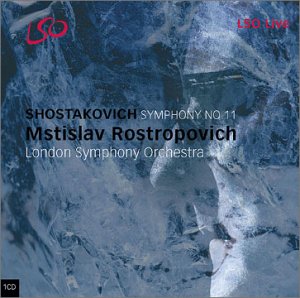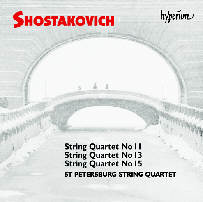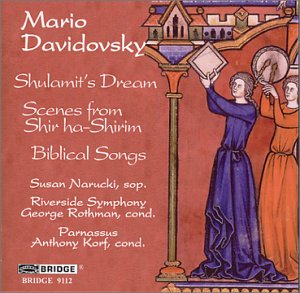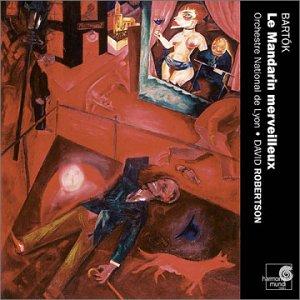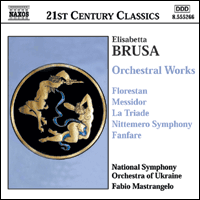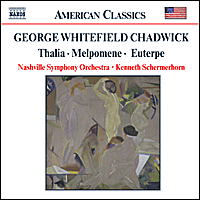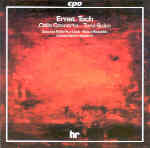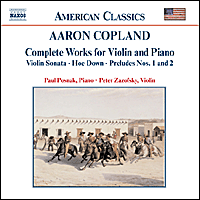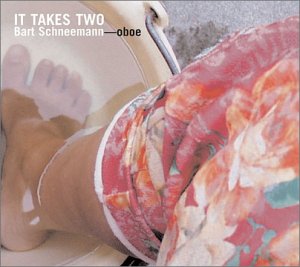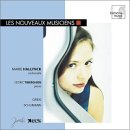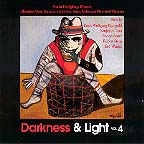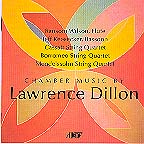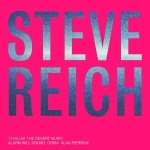
|
Desert
Music / Tehillim
Composer:
Steve Reich
Conductor:
Alan Pierson
Performers:
Ossia, Alarm Will Sound
Cantaloupe
- #21009
Steve Reich/Alan
Pierson
Old Dog/New
Dog
By
Jerry Bowles
You
may not be able to teach an old dog new tricks, but sometimes bringing
a frisky new puppy home can coax a few spectacular post-geriatric Frisbee
leaps out of an elder canine. Something like that appears to be happening
to Steve Reich, whose support of the wunderkind conductor Alan Pierson,
has just produced what is likely to remain for a long time the definitive
recording of Reich's two choral masterpieces--Tahillim and The Desert Music
(Cantaloupe CA21009).
Both
Tehillim and The Desert Music are deeply felt personal works that reflect
Reich's ongoing quest to marry music to spirituality in both religious
and everyday life. Tehillim is a Hebrew setting of four Psalms while
The Desert Music takes its texts--including a haunting reflection on Hiroshima--from
the poet William Carlos Williams. Without sacrificing the strong
rhythmic pulses that are the heart of Reich's music, Pierson draws a purity
of tone from his performers that frees the texts from the somewhat secondary
and muddy place they held in previous recordings. The result is a
complete and satisfying musical experience--exuberant, mesmerizing and
literate. These performances are labors of love and it shows through
in every note.
What
makes them even more remarkable is that they are performed not by some
well established new music group but by Ossia, a student ensemble from
the Eastman School of Music, abetted by a group of recent Eastman graduates
called Alarm Will Sound--all led by Pierson, who was barely out of Pampers
when the 65-year-old Reich wrote Tahillim in 1981 and The Desert Music
in 1984. In fact, young Pierson, who graduated from MIT with a degree
in physics, is just now wrapping up his doctoral studies in conducting
at Eastman.
To say
that this release completely blows away Michael Tilson Thomas' earlier
versions of both works is not to diminish MTT but to simply point
out how good Pierson really is. He has an innate ability to get into
the mind of the composers he likes and is exceptionally adept drawing extraordinary
performances out of blue collar players.
We had
a first-hand preview of this recording back in May when Pierson played
both these pieces with the same groups at Miller Theater. Of that
performance, my partner Duane Grant wrote in these pages: "As conductor,
interpreter and the re-orchestrator Pierson infused the music with spirit
and energy. He knows the music and knows what he is doing. He is
someone to watch… I walked away thinking that I had heard and seen something
really remarkable."
To be
absolutely fair to Tilson Thomas, Pierson has been studying and researching
both Reich pieces for more than two years now and Ossia and Alarm Will
Sound have performed them publicly on numerous occasions. In addition,
dozens of hours have obviously been spent in rehearsals--a benefit of using
a student ensemble whose members don't march to the beat of a musicians
union time clock.
Equally important
in making comparisons is the fact that Tilson Thomas premiered and recorded
The Desert Music in an orchestral version. Reich quickly revised
it for chamber ensemble and keyboards.
Although the
orchestral version hasn't been performed since and the chamber version
has become very popular, this Cantaloupe release is the premiere recording
of the chamber piece. In what can only be described as new pup chutzpah,
Pierson even suggested some "improvements" to Reich--more brass, no keyboards--to
which the old dog agreed.
Pierson also
provided some revisions--more strings and other small but significant alterations—to
Music for Large Ensemble, which he conducted on the recent Triple Quartet
recording. (Nonesuch - #79546)
All in
all, there is a lot to admire here—the emergence of brilliant young conductor;
further evidence that Cantaloupe is turning out the most provocative and
exciting new music on the classical CD market today, and reaffirmation
that Steve Reich is not only one of our greatest living composers but a
cagey old Rover who is not ready for the canine retirement home just
yet.
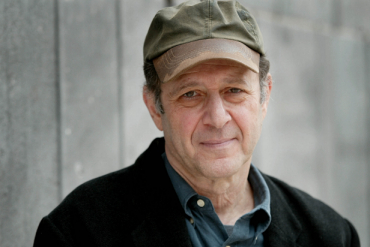 |
|

|
|

|
| AND
IN THIS CORNER... For a critic, reviewing a work of new music presents
unique challenges, not the least of which is that the composer is still
around to shoot back if s/he doesn't like what's written. Two Pulitzer
Prize-winners - one a composer, one a critic - see the conflict from decidedly
different angles, and the debate ranges from whether critics are capable
of recognizing a bad performance of a good piece to whether composers drastically
overstate the impact of critical assessment. Andante 09/01/02
THE
LITTLE LABEL THAT COULD: "This year marks the fifteenth anniversary
of Naxos, the once dowdy little budget record company that is now the biggest
independent classical label in the world. Back in 1987, Naxos’s founder
and CEO Klaus Heymann decided to record 100 popular classical music titles
as a sideline to his main business of distributing sound systems in Asia.
From that humble beginning Naxos grew into an international conglomerate
with 250 employees and a catalogue of over 2400 CDs... Today Naxos dominates
classical music sales in the UK, Germany, and Scandinavia with 30%-80%
of the per unit classical market." La Scena Musicale 09/01/02
LIONEL
HAMPTON, 94: It's a good bet that, absent Lionel Hampton, the world
would never have come to think of vibraphone as a great jazz instrument.
But Hampton, who "until recently continued to tour the world with his own
immensely popular big band, was an extremely important figure in American
music, not only as an entertainer and an improvising musician in jazz,
but also because his band helped usher in rock 'n' roll." Hampton died
in a New York hospital this weekend. The New York Times 09/01/02
THE
NEW BERLIN: Conductor Simon Rattle takes over direction of the Berlin
Philharmonic next week. And already he's sending strong signals that he
plans to shake things up and revitalize a decidedly traditional institution.
"A lot of our work is as much urban regeneration as anything else. If you
believe that in any sense music is a moral force then part of our job is
to help to deal with the state of the city. This is, after all, the most
famous divided city in the world apart from Jerusalem." The Guardian (UK)
08/30/02
BETTER
- BUT AT WHAT COST? What's that? A new music format? So good it'll
revolutionize the way you listen? "To many people, word that the music
industry is launching a newer, shinier music disc when they have only just
mastered opening a double-CD jewel case without the contents braining the
cat, is not a cause of unalloyed joy. The sound is 3D, thrilling and —
of course — thoroughly depressing." The Times (UK) 08/30/02
CHARISMA
FAILURE: It seems almost inexplicable that the human race, with its
ravenous appetite for entertainment, should have failed over quarter of
a century to produce another Callas and Elvis. Neither Pavarotti nor Madonna
come close, nor ever will. The desperate efforts of a universal music industry
have yielded nothing more enduring than Cecilia Bartoli, the mini-voiced
mezzo who tops the opera charts, and the high-kicking, faintly archaic
Kylie Minogue, who belongs more to the smiley era of the Andrews Sisters
than to the grim virtual reality of Bill Gates." London Evening Standard
08/28/02
TONE
DEAF REMEMBRANCE: Songwriters so far haven't been very eloquent around
the subject of 9/11. Many have tried, and "it's understandable that successful
songwriters (as well as scores of aspiring ones) feel compelled to express
themselves in a time of trauma. They have been blessed with the ability
to communicate and feel it is their duty to make music, the same way a
firefighter feels it's his or her duty to go into a burning building. In
the process, it is easy to lose artistic discipline and judgment. The biggest
mistake is trying to write an anthem that addresses the topic head-on rather
than with a poetic distance." Los Angeles Times 08/28/02
BAD
NEWS FOR CLASSICAL MUSIC: A new study of UK and US music habits "found
that concert attendances by British people under 47 had plummeted since
1990. Young audiences 'distrusted' cultural institutions, including orchestras,
which they perceive as 'authoritarian'. The report found that over one
third of British people had attended a classical concert, and only 12%
did so in the past year. This was a sharper fall-off rate than theatre,
visual arts or festivals, suggesting people who went into a concert hall
did not like what they found and did not go back." The Guardian (UK) 08/28/02
THERE
HAVE BEEN STRANGER LIBRETTOS: The sudden death of Princess Diana may
not seem like the perfect subject for a fully staged opera, but that's
exactly what composer Johnathan Dove has made of it. Even more surprisingly,
the made-for-TV opera, which premieres this weekend on a cable network,
is pretty good stuff, according to Olin Chism. "Mr. Dove's music is tonal
and unusually attractive without being simplistic. His use of the orchestra
is highly effective, giving added point to many dramatic scenes. A solid
group of performers enhances the whole." Dallas Morning News 08/28/02
I
HEAR GHOSTS: TV show deadlines are so hectic, more and more composers
are delegating work to ghostwriters. "It's definitely one of the dirty
little secrets of the film and television music industry." But what happens
when royalties are paid out? The composer listed on the credits gets paid,
but not the ghostwriter, who often doesn't have a contract. Now a prolific
ghost is suing, and the system of paying for TV music is under attack.
Detroit Free Press 08/27/02
TROMBONE
IN TROUBLE: So few students are taking up study of the trombone (and
a few other unpopular instruments) that some experts say there will be
a shortage of players in years to come. The British "government's youth
music advisers are so concerned that they are preparing a national campaign
to rescue the trombone and other 'endangered' instruments such as the bassoon
and double bass, warning that British orchestras might soon have to look
abroad for players." The Guardian (UK) 08/26/02
MUSIC
SALES DOWN: Sales of CDs are down 7 percent in the first half of this
year compared to last year says the Recording Industry Association of America.
That, says the RIAA is evidence that internet filetrading is impacting
music sales. "I would not argue that downloading and copying are the only
factors at work. But we have clear evidence that downloading and copying
do not have a favorable effect on record sales." Wired 08/26/02
|
Last
Week's News

|
Record
companies, artists and publicists are invited to submit CDs to be considered
for our Editor's Pick's of the month. Send to: Jerry Bowles, Editor,
Sequenza 21, 340 W. 57th Street, 12B, NY, NY 10019 Also, feel free
to nominate your favorite composer-- even if it's you--for Spotlight of
the Week.
|

|

Next
Wave
Festival |
| In
October, 1983, The Brooklyn Academy of Music, better known as simply BAM,
unleashed upon the world its first Next Wave Festival. The world of contemporary
performing arts hasn't been the same. During the past 20 years, artists
from around the globe have presented more than 1,000 Next Wave Festival
performances experienced by more than one million people.
The
20th Next Wave Festival begins on October 1 and end on December 22.
Here is our selection of the musical highlights. To read more about each
individual event, click on the image. |
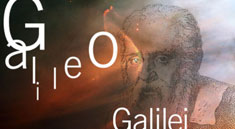 Galileo Galilei, An opera by Philip Glass
Libretto
by Mary Zimmerman with Philip Glass and Arnold Weinstein, Directed by Mary
Zimmerman
Galileo Galilei, An opera by Philip Glass
Libretto
by Mary Zimmerman with Philip Glass and Arnold Weinstein, Directed by Mary
Zimmerman
Eos
Orchestra
BAM
Howard Gilman Opera House
Oct
1, 3—5 at 7:30pm
|
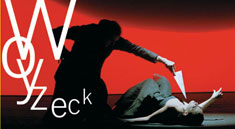 Woyzeck, Music and lyrics by Tom Waits and Kathleen Brennan, Direction
and design by Robert Wilson
Woyzeck, Music and lyrics by Tom Waits and Kathleen Brennan, Direction
and design by Robert Wilson
BAM
Harvey
Oct
29—Nov 2, Nov 5—9, 12—16 at 7:30pm
Nov
3 & 10 at 3pm
|
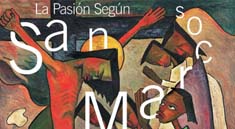 La Pasión Según San Marcos, Osvaldo Golijov
La Pasión Según San Marcos, Osvaldo Golijov
Conducted
by Robert Spano
BAM
Howard Gilman Opera House
Oct
30, Nov 1 & 2 at 7:30pm
|
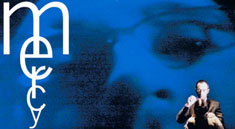
mercy
A
new work by Meredith Monk and Ann Hamilton
BAM
Harvey
Dec
3—7 at 7:30pm
|
Water
Passion After St. Matthew
Composed
and conducted by Tan Dun
BAM
Harvey
Dec
11, 13 & 14 at 7:30pm .
Classical
Grammy Winners
Previous Interviews/Profiles
Simon
Rattle, Michael Gordon,Benjamin
Lees, Scott Lindroth,
David
Felder, Mark-Anthony
Turnage, Erkki-Sven Tüür,
John
Luther Adams, Brett Dean,
Judith
Lang Zaimont,
Meyer
Kupferman, Evan Chambers,
Poul
Ruders,
Steven R. Gerber,
Gloria
Coates
Previous Articles/
Busoni
The Visionary
The
Composer of the Moment: Mark-Anthony Turnage
Electronic
Music
Voices:
Henze at 75
Henze
Meets Emenim
On
Finding Kurtag
Charles
Ruggles: When Men Were Men
Ballet
Mécanique
The
Adams Chronicles


|

| Matri
Mia
Banda Ionica
Dunya
July 2002 |
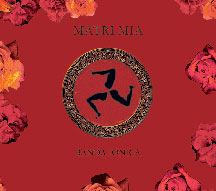 |
A little Sicilian
brass band music with more than a hint of pathos and plaintive passion
for your summer listening pleasure . Just when you thought you had heard
just about everything; or at least a little taste of everything comes Matri
Mia a new recording from the Italian group Banda Ionica.
The songs on
Matri Mia , some instrumental, others with words are all dedicated to women,
and in particular to the great Mother who gives her all with love, an encounter
between the moving melodies of southern Italian music and the intimate
realm of the songwriter who opens up his soul's suitcase for our inspection.
Beautiful tunes and vocal melodies and sonorities from the brass and woodwinds.
Put it on in the early evening, pour a glass of red Italian wine and you've
got instant amore. --Duane Harper Grant |
|




